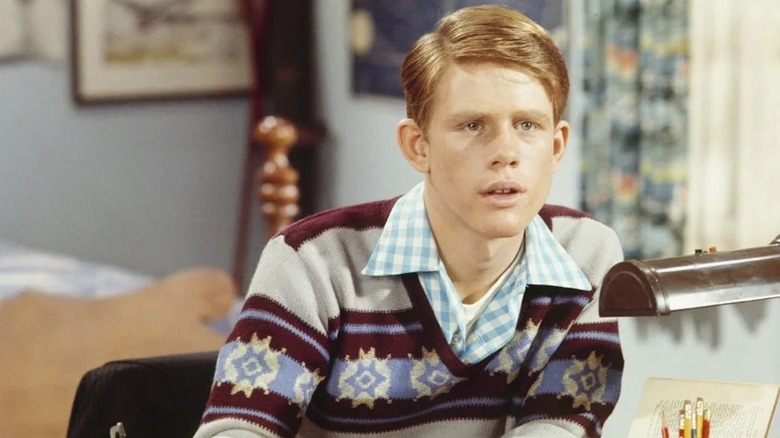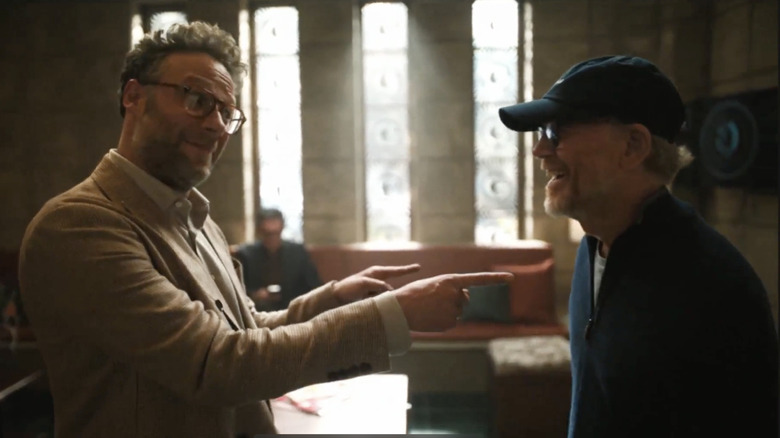The Studio Lets Ron Howard Eviscerate His 'Nice Guy' Happy Days Persona In A Brutal Episode
Hollywood is often portrayed as a hedonistic playground for libertines and opportunists, and, well, it is. But you don't have to be a lousy human being to succeed in the entertainment business. Some people actually become rich and famous because they're talented, diligent, and kind to their collaborators. Though the long, sometimes grueling hours that go into shooting a movie or television show can make it hard to be a present partner and parent, plenty of people manage to strike a work-life balance that doesn't end in divorce and kids in rehab by the age of 13.
The problem with achieving fame in entertainment is that you become grist for the gossip industry, which means people can make money off your every slip-up. Divorces turn into headline-generating scandals even when they're amicable. An innocuous traffic stop gets examined under a microscope for evidence of substance abuse or mental health issues. Get caught on video accidentally failing to hold the door open for the person behind you, and you're branded an inconsiderate jerk.
You can be a perfectly decent person and get portrayed as a monster in the media. So it's nothing short of a miracle when someone with a career that spans a half-century is viewed as not just decent, but ... nice. These are the folks about whom you never hear a negative word. People who work with them yearn to work with them again. People who encounter them in public come away with a gladly provided selfie, autograph, or handshake. And you know exactly who these people are. Tom Hanks, Meryl Streep, Paul Rudd, Drew Barrymore, Henry Winkler and, of course, his "Happy Days" co-star Ron Howard. In my 26 years of working in this industry, I've probably heard more glowing compliments about Howard than anyone of his stature. The man who broke into acting at the age of six as adorable lil' Opie on "The Andy Griffith Show," came of age in America's living room as good kid Richie Cunningham in "Happy Days," and smoothly segued to a directing career where, since 1977, he's tackled just about every genre imaginable. Even when Howard's films missed the mark, he at least did so with good intentions.
So when he turned up in the third episode of Seth Rogen and Evan Goldberg's screamingly funny showbiz satire "The Studio," I figured Rogen's newly appointed, in-over-his-head studio chief would treat him as horribly as he did Martin Scorsese in the pilot. I could not have been more wrong, and I could not have laughed harder at how they subverted my expectations.
How do you tell an Academy Award-winning director he's made a horrible mistake?
At the outset of the episode titled "The Note," Rogen's Matt Remick, the head of Continental Studios, settles in with his executive team (Ike Barinholtz, Kathryn Hahn, and Chase Sui Wonders) for a lot screening of Ron Howard's completed new film. It's an uncharacteristically gritty crime flick for Howard (think the opening of "The Paper," one of Howard's best films, stretched to feature length) starring Anthony Mackie as a New York City cab driver who gets caught up with a gut-shot gangster played by Dave Franco. The movie, "Alphabet City," wows the execs at every turn, but just when they think Howard has stuck the landing, the film cuts to what feels like a denouement tying up a loose narrative end regarding the child we saw in a picture with Mackie at the beginning. It seems fine (we know how Matt feels about bookends), but then Mackie and the kid repair to a motel, which leads to a scene that pads the tight two-hour feature out to nearly three hours.
Matt and his team are aghast. Howard has delivered a bloated film that exhibitors say will cost the studio two screenings a day at the multiplexes, thereby limiting its box office potential. But all hope is not lost. Matt discovers that Howard is still making "tweaks," so he has the opportunity to give the director a note that might convince him to cut the motel scene. What's more, he's Ron Howard, the nicest guy in Hollywood. Surely, he'll listen to reason (or at least take the note in stride).
There's just one catch: Matt doesn't want to personally give him the note because, at the very start of his career in 2001, he attended a friends-and-family screening of "A Beautiful Mind" where, in front of all of the attendees (including Steven Soderbergh and the Coen brothers), he suggested that Howard reveal early in the film that Charles (Paul Bettany) is an imaginary character. Howard responded by viciously ridiculing Matt to the howling delight of the audience. Evidently, Matt is the only person in Hollywood who's seen the cruel side of this beloved filmmaker.
This leads to Matt cowardly delegating his responsibility as a studio head to his charges, none of whom can bring themselves to deliver the note. They're first scared off by producer-star Anthony Mackie unexpectedly dropping by for the marketing meeting, but they tuck their tail even tighter when Matt's predecessor Patty (Catherine O'Hara) reveals that the interminable motel scene is a tribute to Howard's dead cousin. Matters take a turn for the worse when Anthony Mackie confides in the execs that he, too, hates the motel scene.
With his back against the wall, Matt must finally step up and tell the Academy Award-winning director, the man he most fears in Hollywood, that the motel scene doesn't work. This is when Ron Howard goes shockingly, hilariously nuclear.
Do not wake the beast that lurks inside Ron Howard
For the third episode in a row, Rogen and Goldberg expertly stage a mounting series of cringe-inducing humiliations that climaxes with Matt getting harangued by a prominent filmmaker. Think it's hard to top a browbeating from Martin Scorsese (whose passion project, the last film of his career, Matt's not only shot down but caught and killed for good) or a tirade from Sarah Polley (whose meticulously planned one-take shot Matt ruins via clumsy, well-intentioned interference)? Howard's heel turn is one for the ages.
And it is a heel turn because if Mackie, who stands to gain an Oscar nomination for his performance in the movie, detests the scene, the viewer senses that it must be awful. Regardless, Matt errs by giving the note at the end of a marketing presentation, and Howard is on him from jump. Because, contrary to what Matt believes, he does remember the "A Beautiful Mind" screening, and he can't wait to pants the new studio chief in front of his staff by relating the story.
When Richie Cunningham's ire got piqued, he typically responded with a petulant retort that ended with "Bucko." "The Studio" version of Howard is a master of invective by comparison. He relishes this retelling, goofing on Matt by asking if he would've told M. Night Shyamalan to step up the reveal of Bruce Willis as a ghost in "The Sixth Sense," and in a way that goes lightyears beyond good-natured ribbing. Howard hates Matt.
Howard, the actor, however, loves playing the a-hole for once, particularly as himself. He hasn't lost a step as a comedic performer, and because he's clearly having a blast in front of the camera, this raises the question as to why he doesn't let 'er rip more often. He's so good here that he could wind up winning an Emmy for Outstanding Guest Actor in a Comedy. I'd love to get Ron Howard the actor back, and, if he's down for it, I'd like nothing more than for him to further explore his inner bastard.


